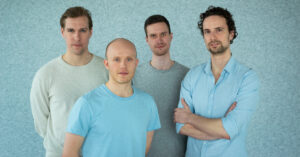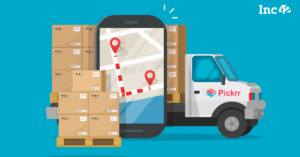Kumar, a ten-year-old student from Mathura, was fascinated to see kids learning to code and making apps and games, which led his parents to get him a trial class with a leading kid’s coding online academy. But Kumar was worried that tech can only be learnt by English-medium students.
Jaipur-based set out to solve this problem by providing online coding courses to students from smaller towns in their preferred language. Before this, the startup was working to help kids learn tech better.
A recent report by the education ministry revealed that about half of India’s students study in Hindi-medium schools.
“The thing is that currently, all coding courses in the market are available only in the English language,” points out Sharad Bansal, Co-founder and CEO of Tinkerly.
The Jaipur-based startup was started in 2015 by IIT-Delhi and XLRI Alumni Sharad Bansal, OP Godara, Kapil Arya, and Vivek Pathak as Srjna that provided portable subject-learning models to school for experiential learning.
It gradually pivoted to its own innovation lab called Tinkerly where it taught AI, robotics, and coding with physical kits, and now as a natural progression, it is expanding its reach to non-English speaking students via its B2C online classes started during the pandemic.
Sharad says that it will be adding more Indian languages like Gujarati and foreign languages with advanced AI-driven transcription and translation technology. With a team of 28 people, the company aims to provide localised learning to kids across the world and across socio-economic backgrounds, adds Sharad.
Till date, Tinkerly has taught more than 150,000 students across India, Middle East, and North America, and is looking to expand rapidly this year.
Edtech and evolution
Sharad, Om Prakash, and Kapil were batchmates at IIT-Delhi. They observed how practical sessions pepped up their engineering coursework. They decided to bring a similar approach in schools to make learning fun and interactive. They carried out a survey and found that most schools did not have the bandwidth or know-how to push practical teaching. So, the trio joined hands with Vivek Pathak, a common friend, and set up Tinkerly to help school kids by preparing them for futuristic skills in the field of technology.
Initially, the company helped schools add STEM kits during regular courses and then eventually became a company that set up Tinkering Lab or Innovation Lab in schools along with providing a coding curriculum as per NEP guidelines. The company is a registered vendor on ‘Govt. E-Marketplace(GeM)’ to set up Atal Tinkering Labs sponsored by NITI Aayog.
In late 2020, the company ventured into Direct-to-Consumer(D2C) offerings like online 1:1 Live Classes and STEM Kits. The model is simple where the startup delivers a hybrid method of teaching school-age kids online. It promises them not just to learn how to code but to do more with applications of programming into hardware gadgets like Robotics, AI, and IoT.
Sharad says the courses provided by Tinkerly educate children not only about how to code but also teach them how to build things using that code.
“Tinkerly’s coding courses on Robotics, IoT, and AI take the student’s learning beyond the screen with a blend of STEM toys in online live classes. It enables kids to design, build, and deploy their code to make cool real-life tech-based projects,” he says.
Growth story
Tinkerly was operating in the B2B space till February 2020. But after the coronavirus outbreak hit, the startup preponed its plans to go direct to consumers (D2C), and opened doors to a huge opportunity of serving millions of students globally.
Sharad says that Tinkerly’s monthly revenue has grown eight times in the past three months since the launch of a new version of its learning platform Let’s Tinker in April this year. The platform has more than 50,000 online learners.
The company’s existing reach in 6,000+ schools and 100+ learning centres allows it to acquire 60 percent of its users from organic channels at near-zero CAC.
Market and competition
Coding is quickly evolving into the de facto measure of student success in India. Although the pandemic is finally showing signs of slowing down, the technology industry is not. The future of coding looks bright, and the tremendous success of innovative tech solutions over the past two years — as a replacement for offline activities — has proven the “new normal” is here to stay.
India’s online education market is expected to be worth more than $3.5 billion by 2022 — almost five times the $735 million it was worth in 2019, according to a report by edtech focussed VC firm BLinC Invest. Some of the big players that Tinkerly competes with include Unacademy, BYJU’S, Tinker Coders, and Coding Ninja, to name a few.
According to Sharad, what differentiates Tinkerly is that it focusses on experiential learning and provides STEM learning physical kits for online courses as well.
“For first-time coders, it is the best alternative to monotonous online coding classes that offer more engaging ways to develop logical skills,” says the CEO.
By offering coding classes in various languages, the startup will differentiate itself even more from other platforms that cater to a very ‘niche’ segment of students, according to the founders. Sharad shares that Hindi coding courses are gaining massive traction from Tier-II towns and that the company wants to expand its market share among ‘bharat’ learners.
Funding and plans ahead
Tinkerly recently raised Rs 6.5 crore from Navneet Tech Ventures, (a wholly-owned subsidiary of Navneet Education Limited(NEL). With this round, the total funding in the company reached Rs 10 crore.
Other investors include SucSEED Angel Network, Keiretsu Forum, and Rajasthan Angels (Rain).
Speaking about the company’s plans, Sharad shares the main objective is to make its coding courses accessible to every student, irrespective of their socio-economic status.
In the coming year, Tinkerly aims to make its global expansion as well with regional languages and distribution networks starting with Arabic for Gulf council countries.
“Our plans for the upcoming months are to focus on product development, increase consumer awareness, and look for expansion in new geographies with vernacular content. This will help to create a strong global (global with localised enhancements) brand,” says Sharad.

![You are currently viewing [Startup Bharat] Started by IIT alumni, Jaipur-based Tinkerly is helping students learn coding in their regional language](https://blog.digitalsevaa.com/wp-content/uploads/2021/11/Imaget5tf-1637825102531.jpg)








